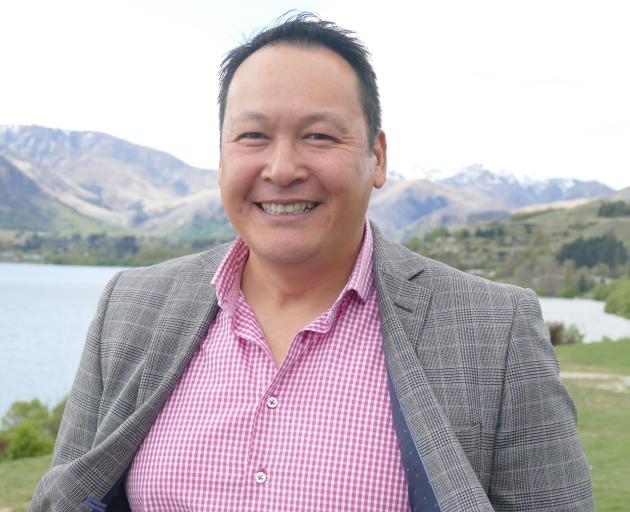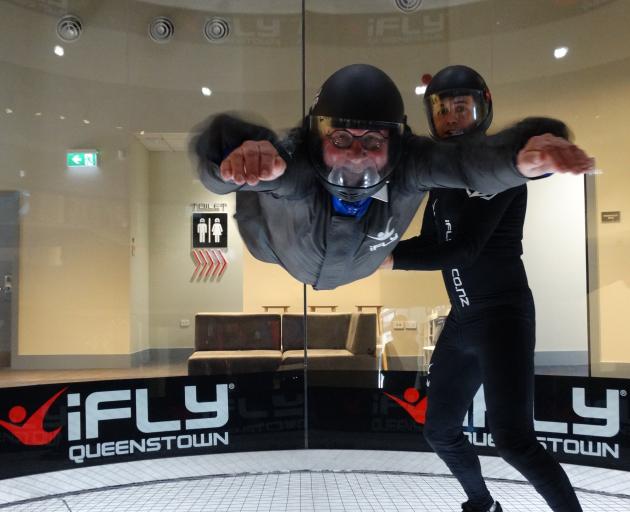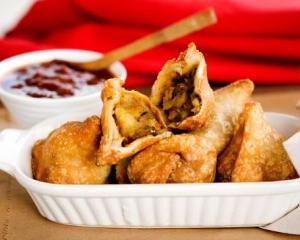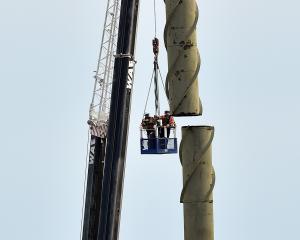
Matt Wong describes himself as "a little bit of a maverick".
The Queenstown businessman likes autonomy, the ability to make his own decisions, which means working for corporate business does not really spin his wheels.
When he gives a presentation to students at the Queenstown Resort College, his aim is to be inspirational. Rather than discussing all the hindrances to creativity and entrepreneurship, Mr Wong "wants them to go into the world, forget anything that has happened in the past and what you can’t do ... and just bloody try and do it anyway".
Think Queenstown and tourism in the same breath and you could be forgiven for painting a mental image of doom and gloom over the past few years; the resort town battered and bruised from the impact of Covid-19.
Mr Wong, who owns iFLY Indoor Skydiving with his wife Amy, acknowledges the past two and a-half years have been "horrible" for many. For him, it has been the most exciting time of his life.
He’s an affable and interesting character — a breath of fresh air — who is passionate about the Southern Lakes area, his enthusiasm for both his business and adopted home patently obvious.
Giving back is something that is important to him; he is on the board of the Queenstown Chamber of Commerce and a councillor on the Queenstown-Lakes District Council.
Tourism was not always his dream career; he grew up in Greytown, in the Wairarapa, where his father owned a market garden. It was there that he became fascinated with bird species, particularly birds of prey, and his dream was to save native wildlife — that was all he wanted to do.
The former Young Ornithologist of the Year and chairman of the Raptor Association of New Zealand completed a master's of science at Massey University, in ecology and zoology, and spent a year on a research internship at the Hawk Mountain Sanctuary Association in Pennsylvania.
Returning to New Zealand, he worked in conservation for 11 months "and lost all passion for conservation" due to bad employment experiences, he said.
He was at a crossroads — for 20 years, all he had wanted to do was work in wildlife — but he had lost his way with conservation. At that stage, he was in Queenstown and he got a job selling tourism products; from there, he moved into a supervisor role and then general manager of the iSITE Visitor Centre, kicking off his tourism and leadership career.
He ended up running both the visitor centre and United Travel in Queenstown, and then running the travel agency in Wānaka as well.
After 11 years, and feeling "pretty boxed in", he was shoulder-tapped to run a helicopter company which undertook a wide variety of work, from cherry drying and fire fighting to conservation work and movie filming.
In the second year, the company was bought out by Ngāi Tahu Tourism and he ended up running a base in Franz Josef, as well as Queenstown.
Mr Wong was initially intrigued to work for a corporate business — "turns out I don’t like working for corporates", he laughs — and so he ironically joined another corporate.
iFLY was a global indoor skydiving brand, based in the United States, with 80 wind tunnels around the world. He applied for the general manager job in Queenstown where it was opening a tunnel.
With a desire to eventually start his own tourism business, he was keen to launch iFLY in the town, acknowledging he "didn’t really think about how hard it would be to launch a new business".
The $15 million wind tunnel was built at the foot of the Queenstown Skyline gondola in Brecon St and the business launched in 2018. But the company "cookie-cut" the model into New Zealand and it did not work, the country being a very different beast from the US, he said.
He candidly acknowledged that 2019 was an "absolutely crap year" and that was even before Covid-19 hit, decimating so many tourism businesses.
The good thing about that year was that they made "a heap of mistakes", something that did not daunt him. They had to be creative about how to generate revenue and getting the team of staff right was probably the best thing that could have happened to the business, leading into the pandemic, he said.
"It gave us all this innovation muscle no-one else had. We were entrepreneurial thinking, we were happy to fail heaps. We were just hungry for it," he recalled.
During the first lockdown period, there was no revenue coming in so iFLY started selling gift vouchers at a reduced rate and people started buying them.
The first day it reopened after the Covid restrictions, there were 10 customers. That heartened Mr Wong that there was a base to build on.
In the July school holidays of 2020, the business broke the revenue record for the month, not only for Queenstown but for iFLY globally. "We just went, ‘right, we can survive this’," Mr Wong said.
Not that there was really a choice; the iFLY directors at the time told him they did not know New Zealand, the market or the staff, so he would have to "do what you have to do to get out of this mess".
That was something that did not trouble him as he enjoyed autonomy and liked disruption, he said.
It was an interesting time, he recalled, as those around him were thinking "bottom line" and the need to get rid of costs — labour being the big one.
He spoke to his business mentor and admitted he did not know what to do. He had a team that he had worked with for two years; they had gone through turmoil to get the right team and now, having got it, he was potentially going to have to let them go.
He was given a simple answer — "panic slow" — "if you don’t need to get rid of them today, don’t get rid of them today".

There was also a philosophy around empowerment and involving the team in how the business was going to recover. And from then, through to now, that was the way the iFLY team had evolved.
And it had been "just awesome", watching young millenials — often the topic of negative talk — being given purpose and a sense of belonging and responsibility, he said.
The team of 13 was the best team he had ever run and, while the nation was going through labour issues, that was not the case at iFLY.
Advertise for a job and the best applications could be cherry-picked, such was the reputation of the business, he said.
Where as other businesses were going through the pain of a labour shortage, iFLY was in an "amazing position".
But had the business not gone through the hardship of its first year of operation, and had he not received the right advice at the time he needed it, it was highly likely there would have been redundancies, he said.
Eight months after Covid-19 hit, Mr Wong started negotiations to buy the business.
The global company saw its Queenstown business was "making some amazing waves" but knew it did not know the market; it was reliant on local management to run the business.
iFLY had an "amazing director", who asked Mr Wong if he wanted to buy the business.
The experience taught him that business was not always about money; it was about great relationships with people.
"He made it happen. It’s that cliche ... never waste a good crisis. It was just a fairy tale in terms of how that came about."
That was not to diminish Covid which was a "massive disaster" but Mr Wong had managed to "find a little glimmer of hope within that whole mess".
By doing the right thing by their staff, they got some great results and that was why the last two and a-half years had probably been the most exciting time of his life, he said.
Last year, iFLY won the excellence in tourism and hospitality award in The Grand Business South Awards.
In 2021, it was named Tourism Industry Aotearoa’s Employer of Choice Award and won the Queenstown Chamber of Commerce’s Excellence in Service Delivery Award.
Mr Wong acknowledged he was now a lot more philosophical about how he approached business; not only staff but also the environment and how to create a circular economy.
iFLY started a youth programme helping primary school-aged children with their mental health. As well as a free skydive, they had sessions with a youth worker to empower them.
With his own two children at primary school, he reckoned if every business in the country did some little thing for its community — not just hand over a voucher or money — but organised a programme that helped a community, "how bloody good would that be?"
When it came to his other community commitments, Mr Wong said he had been concerned about the lack of tourism representation on the local Chamber of Commerce. He enjoyed his board position and talking to people outside the tourism industry.
As far as the QLDC councillor position went, it took him a long time to put his hand up for that one. But, from an individual perspective, it had been fascinating going through the process, working closely with local government and understanding its issues and problems.
It was also an opportunity to see how local government was so bound by legislation.
Unlike private business — "we just go" — it did not have that ability, nor did it have innovation muscle, he said.
Within his own business, failure was celebrated — it could lead to amazing innovation — but local and central government were not allowed to fail, he said.
Mr Wong had stepped away from the operational side of iFLY; he was there for strategy and to ensure the "ship was steering in the right direction long term".
He had bought an e-bike and was prioritising spending more time with his family or fishing with his mates. He laughingly described his wife Amy — the couple met in Queenstown and have been together 20 years — as his long-suffering wife. "She puts up with all of my stuff."
Queenstown was an "awesome" playground. He enjoyed biking, skiing, swimming in the lake, freediving and hunting and fishing.
There was now a massive influx of people, whether from Australia or the North Island, to Queenstown, attracted by the lifestyle, having figured out city life was "not all it’s cut out to be".
But they were not necessarily working in the Queenstown economy and he wanted them to engage "a bit more" in the community.
"We need people living in this community to engage in it and see the social problems we’re having and do their part to fix it as well."













